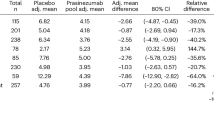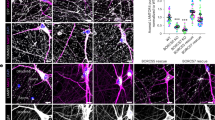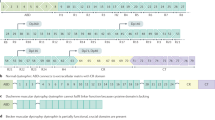Abstract
Severe dyskinesias during the 'off' phases (periods of increased Parkinson's disease (PD) disability) have been observed following intrastriatal transplantation of human embryonic mesencephalic tissue1. Here we retrospectively analyzed 14 patients who were followed for up to 11 years after grafting, and found that dyskinesias (abnormal involuntary movements and postures) increased during postoperative off phases, but were generally of mild to moderate severity. Dyskinesia severity was not related to the magnitude of graft-derived dopaminergic re-innervation, as judged by 18F-labeled 6-L-fluorodopa (FD) positron emission tomography (PET), indicating that off-phase dyskinesias probably did not result from excessive growth of grafted dopaminergic neurons.
This is a preview of subscription content, access via your institution
Access options
Subscribe to this journal
Receive 12 print issues and online access
$209.00 per year
only $17.42 per issue
Buy this article
- Purchase on Springer Link
- Instant access to full article PDF
Prices may be subject to local taxes which are calculated during checkout
Similar content being viewed by others
References
Freed, C.R. et al. N. Engl. J. Med. 344, 710–719 (2001).
Hagell, P. & Widner, H. Mov. Disord. 14, 448–455 (1999).
Boyce, S., Rupniak, N.M., Steventon, M.J. & Iversen, S.D. Clin. Neuropharmacol. 13, 448–458 (1990).
Nutt, J.G. Ann. Neurol. 47 (Suppl. 1), 160–166 (2000).
Lee, C.S., Cenci, M.A., Schulzer, M. & Björklund, A. Brain 123, 1365–1379 (2000).
Cubo, E. et al. Arch. Neurol. 58, 1379–1382 (2001).
Luquin, M.R. et al. Mov. Disord. 7, 117–124 (1992).
Widner, H. et al. N. Engl. J. Med. 327, 1556–1563 (1992).
Hauser, R.A. et al. Arch. Neurol. 56, 179–197 (1999).
Lindvall, O. & Hagell, P. Prog. Brain Res. 127, 299–320 (2000).
Lindvall, O. et al. Arch. Neurol. 46, 615–631 (1989).
Langston, J.W. et al. Mov. Disord. 7, 2–13 (1992).
Fahn, S. et al. in Recent Developments in Parkinson's Disease Vol. 2 (eds. Fahn, S., Marsden, C. D., Calne, D. B. & Goldstein, M.) 153–163 (MacMillan Healthcare Information, Florham Park, New Jersey, 1987).
Acknowledgements
This study was supported by the British and Swedish Medical Research Council, the United Kingdom Parkinson's Disease Society, the Gemeinnützige Hertie Stiftung, the Skane County Council Research and Development Foundation and the Kock, Wiberg, Söderberg and King Gustav V and Queen Victoria Foundations.
Author information
Authors and Affiliations
Corresponding author
Ethics declarations
Competing interests
The authors declare no competing financial interests.
Supplementary information
Rights and permissions
About this article
Cite this article
Hagell, P., Piccini, P., Björklund, A. et al. Dyskinesias following neural transplantation in Parkinson's disease. Nat Neurosci 5, 627–628 (2002). https://doi.org/10.1038/nn863
Received:
Accepted:
Published:
Issue Date:
DOI: https://doi.org/10.1038/nn863
This article is cited by
-
Optimizing maturity and dose of iPSC-derived dopamine progenitor cell therapy for Parkinson’s disease
npj Regenerative Medicine (2022)
-
Levodopa-induced dyskinesia: a historical review of Parkinson’s disease, dopamine, and modern advancements in research and treatment
Journal of Neurology (2022)
-
Human stem cells harboring a suicide gene improve the safety and standardisation of neural transplants in Parkinsonian rats
Nature Communications (2021)
-
Trophoblast glycoprotein is a marker for efficient sorting of ventral mesencephalic dopaminergic precursors derived from human pluripotent stem cells
npj Parkinson's Disease (2021)
-
Longevity leap: mind the healthspan gap
npj Regenerative Medicine (2021)



